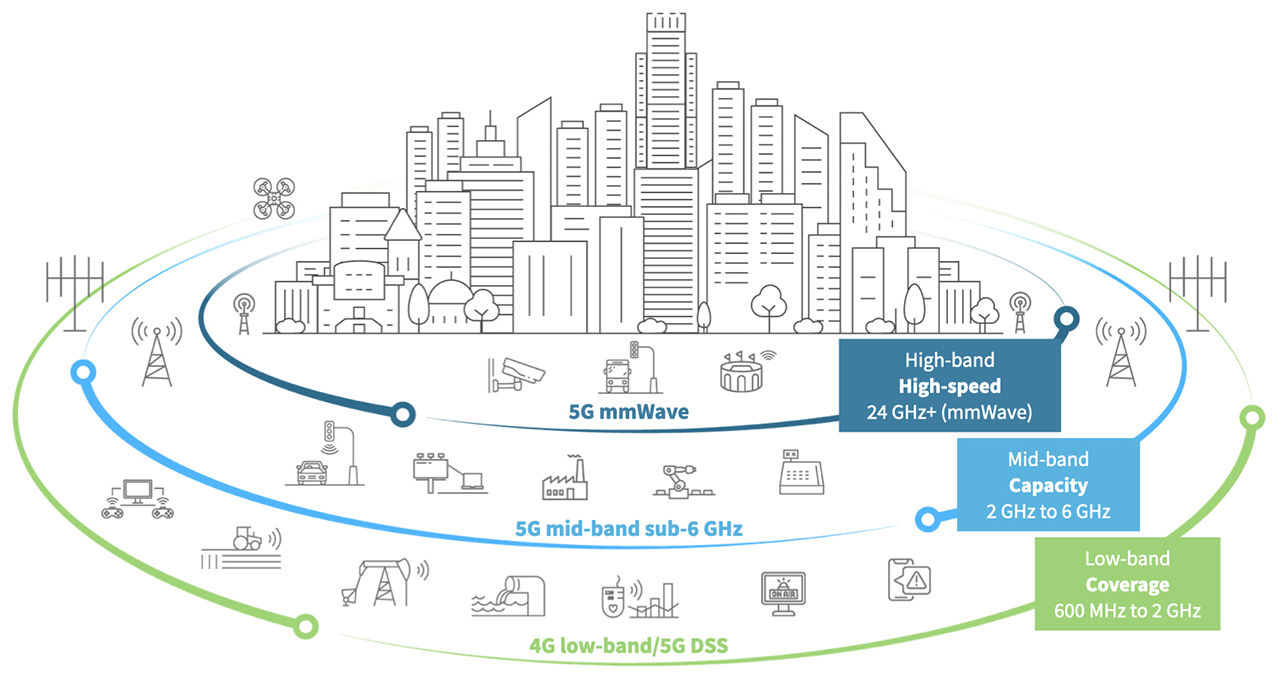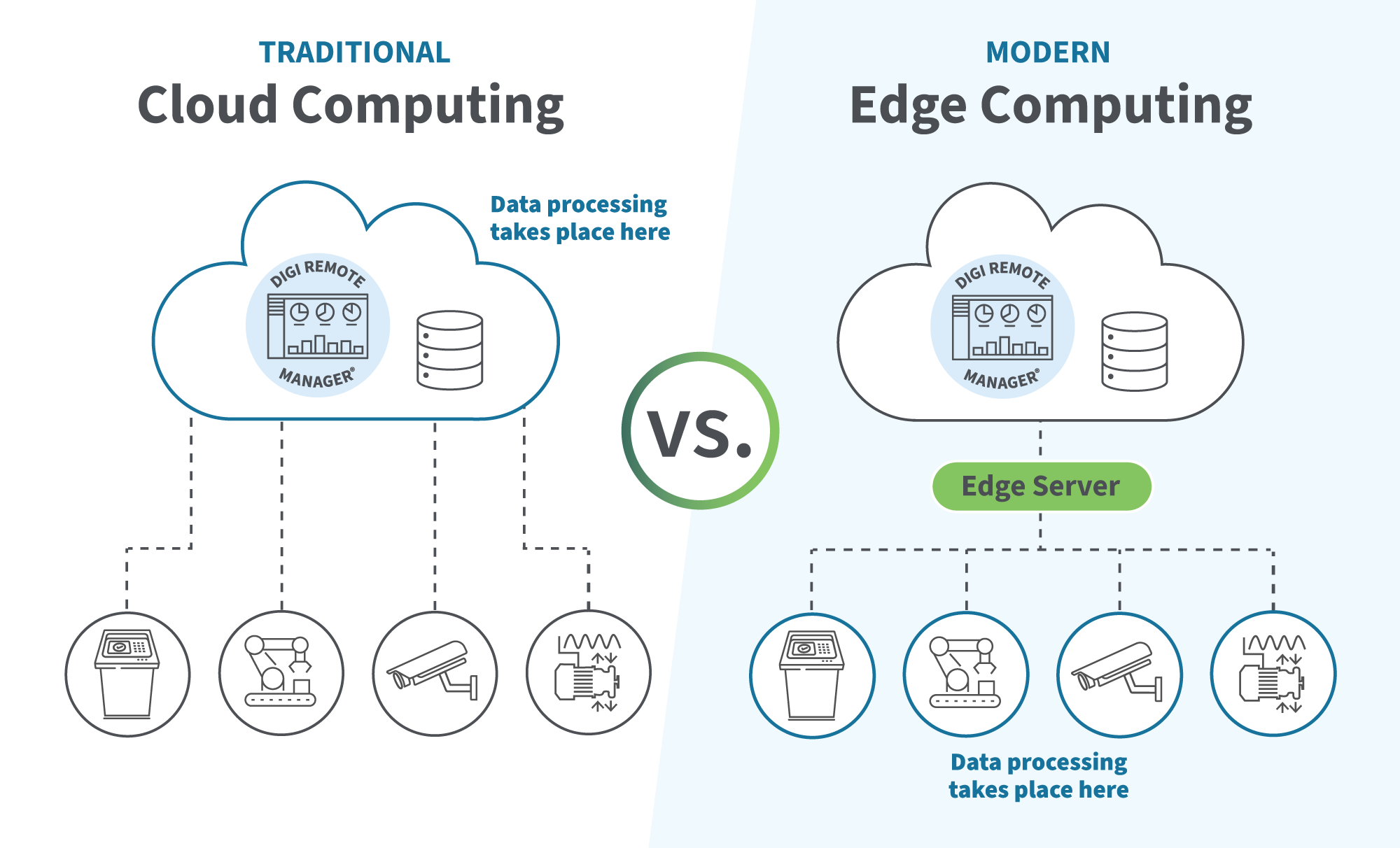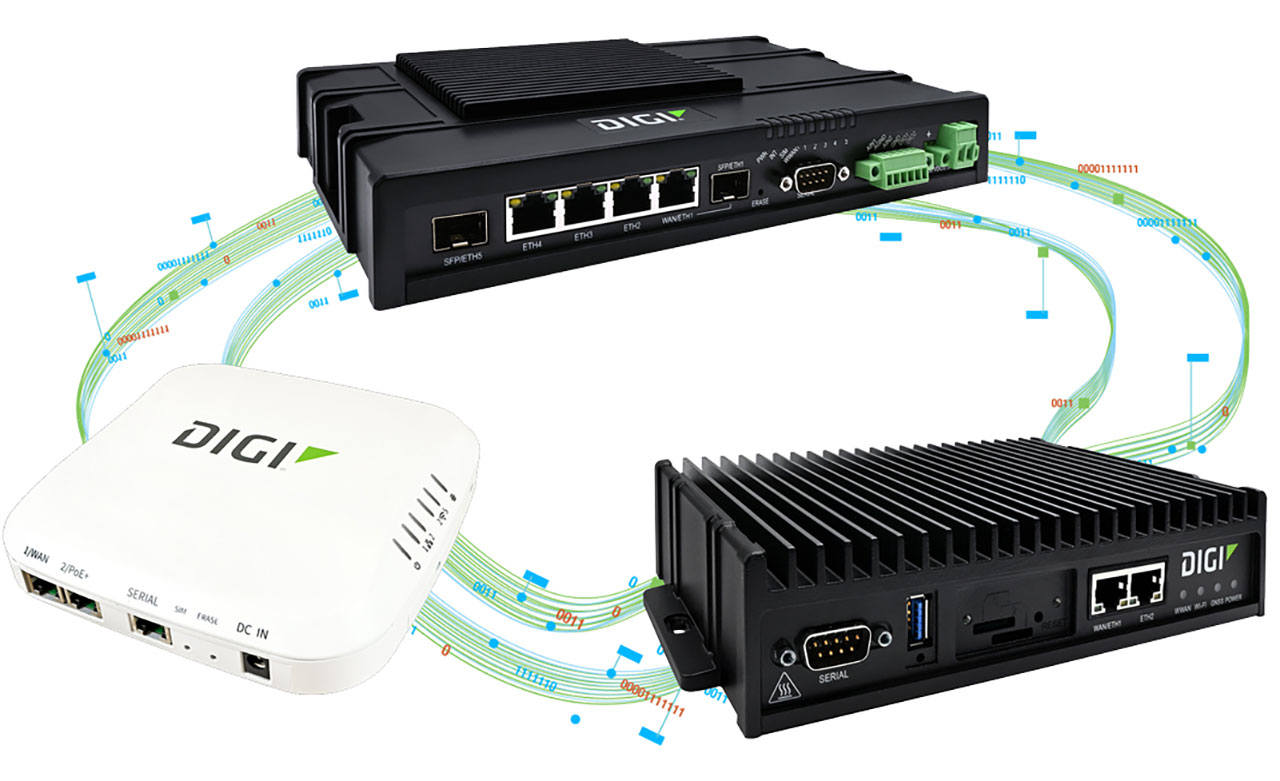Are you wondering what private 5G networks are and how they can benefit your business? You're in the right place. This blog post introduces private 5G networks, how they work, and their practical use cases.
What Is a Private 5G Network?
How Private 5G Networks Work
Deployment Options
Network Architecture
5G Network Ranges
5G Network Technologies
Advantages of 5G Private Networks
Use Cases
FAQs
Get Our White Paper
Plan your journey to 5G and beyond
Download PDF
As businesses embrace digital transformation, the importance of private 5G grows due to its ability to deliver secure, high-speed, and low-latency connections. Understanding the answer to the question, “What is a private 5G network?” reveals its potential to revolutionize industries by offering unprecedented control and performance while significantly impacting economic growth.
In the simplest sense, a private 5G network is a dedicated, local network that provides wireless connectivity tailored to a specific organization’s needs. It offers the utmost speed and reliability, along with heightened security.
What’s the Difference Between Private 5G vs Public 5G?
When comparing private 5G vs. public 5G, the key differences lie in exclusivity and customization. What is private 5G? It's a network designed specifically for an organization, offering enhanced security and tailored solutions that public networks cannot match. These exclusive benefits make private 5G a superior choice for businesses needing robust, secure communication.
A private 5G network utilizes dedicated spectrum and infrastructure to provide secure, high-speed wireless connectivity within a specific area. It consists of small cells, advanced antennas, and edge computing nodes, all managed by a central controller.
Small cells enhance coverage and capacity, while advanced antennas ensure efficient signal transmission. Edge computing processes data locally, reducing latency and improving response times.
This architecture allows for seamless connectivity and real-time data processing. As a result, it’s ideal for applications that require high reliability and low latency, such as industrial automation and smart city solutions.

Several deployment options exist for private mobile network solutions, each with advantages and challenges. Businesses can typically choose from the following strategies to select solutions that best fit their specific needs and goals:
- Standalone deployment: Ideal for maximum control and customization.
- Hybrid deployment: Combines private and public 5G for flexible use cases.
- Network slicing: Utilizes segments of a public network for private use.
- Managed services: Outsources network management to a third party for ease and efficiency.
These options provide various levels of control, cost, and complexity, allowing businesses to select the most suitable approach for their goals.
Get Our White Paper
Learn about private cellular networks
Download PDF
Private 5G networks deliver superior performance and connectivity for connected devices. The private 5G network architecture ensures optimized data flow, low latency, and high reliability, paving the way for advanced applications and services. Here’s a closer look at the specific components and overall layout that make these networks efficient and powerful.
Wondering how 5G architecture is designed to deliver better performance for connected devices?
5G private networks utilize different spectrum ranges to achieve various performance levels. Understanding these ranges helps in comprehending how they impact network capabilities.
- Low band: Offers broad coverage with lower speeds, suitable for wide-area applications.
- Mid band: Balances coverage and speed, ideal for urban environments and dense networks.
- High band: Provides ultra-fast speeds with limited range, perfect for specific high-demand areas.

The technologies powering private 5G networks include advanced innovations that enhance functionality and performance. The following components work together to provide the unique benefits of private 5G:
Learn about Digi and AWS 5G private network compatibility.
Network Slicing
Private 5G network providers offer network slicing, a feature that allows multiple virtual networks to operate on the same physical infrastructure. Unlike previous technologies, network slicing enables tailored services for different use cases, enhancing efficiency and performance. Additionally, this strategy enhances security, as a breach in one slice doesn’t inherently allow the attacker to reach other slices.
While it offers significant flexibility and security benefits, managing multiple slices is potentially complex. Expert tips include ensuring proper isolation and other security protocols for each slice to maximize benefits.
Edge Computing
5G private networks leverage edge computing to process data closer to the source, reducing latency and improving response times. This differs from traditional cloud computing because it offers faster and more efficient data handling.
Edge computing enhances capabilities in real-time applications, such as autonomous vehicles and industrial automation. With proper placement, edge computing improves cloud access latency by up to 30%.
However, it requires robust local infrastructure and can be costly to implement. Experts recommend a hybrid approach, combining edge and cloud resources, to balance performance and cost.

Private 5G network providers offer several key benefits that make these networks a game-changer for businesses. Enhanced security ensures that sensitive data remains protected within the network. Unmatched speed provides lightning-fast connectivity, which is essential for applications requiring real-time data processing. Superior coverage allows seamless communication across vast areas, ensuring consistent performance.
These features collectively enable businesses to operate more efficiently, securely, and effectively, ultimately driving innovation and growth in various industries. Here’s a closer look at the various private network benefits.

Security
A local 5G network significantly boosts security compared to previous technologies. Unlike public networks, private 5G offers dedicated resources, reducing the risk of data breaches and cyberattacks. Additionally, advanced encryption and secure access controls ensure that only authorized users can access the network, protecting sensitive information.
However, implementing robust security measures requires effort. Experts recommend regular security audits and updates to maintain high protection levels.
Speed
Private 5G as a service delivers unprecedented speed, far surpassing previous network technologies. This high-speed connectivity enables real-time data processing, crucial for applications like augmented reality, remote surgery, and autonomous vehicles.
Research indicates that 5G networks can achieve download speeds of up to 10 Gbps, a tenfold increase over 4G, transforming how businesses operate and compete in the digital age. While the speed offers significant advantages, it requires substantial infrastructure investment. Experts suggest a phased rollout to manage costs effectively.
Coverage
Private 5G network providers ensure extensive coverage, offering reliable connectivity across large areas. This broad coverage eliminates dead zones and provides consistent performance, even in challenging environments. Unlike public networks, private 5G allows companies to customize coverage solutions tailored to specific business needs.
However, achieving extensive coverage can be complex and may require additional infrastructure. Experts recommend leveraging a mix of small cells and macro cells to optimize coverage.
Private 5G networks offer transformative benefits across various industries. The key use cases below demonstrate how these networks improve efficiency, security, and innovation.
- Enhanced manufacturing automation boosts productivity
- Reliable remote healthcare enables advanced telemedicine services
- Smart cities enhance urban living through advanced connectivity and data-driven solutions
- Smart logistics improve supply chain management
Each use of these private 5G network use cases highlights the unique advantages of private 5G networks, driving significant impacts in the real world.

Use Case 1: Enhanced Manufacturing Automation
Private 5G networks enable enhanced manufacturing automation by providing ultra-reliable, low-latency communication for connected machines and sensors using IoT devices. This capability ensures precise coordination and real-time data exchange, reducing downtime and improving productivity. Unlike Wi-Fi, 5G offers greater reliability and security. Practical outcomes include streamlined operations and higher efficiency. However, the initial setup cost can be high. Experts suggest starting with pilot projects to validate benefits before full-scale deployment. According to manufacturer expectations, 5G is expected to increase equipment productivity by 42%, with worker productivity rising by 41%.
Use Case 2: Reliable Remote Healthcare
5G private networks facilitate reliable remote healthcare by supporting high-definition video consultations and real-time monitoring of patient vital signs. Unlike slower, less reliable connections, this network's speed and low latency enable effective telemedicine. Practical outcomes include improved patient access to healthcare and reduced hospital visits. However, ensuring data security and patient privacy remains a challenge. Experts recommend stringent encryption and access controls.
Use Case 3: Smart Logistics
A private 5G network revolutionizes smart logistics by providing seamless connectivity for tracking and managing supply chain operations. This connectivity enables real-time visibility and automation, improving efficiency and reducing errors. Compared to traditional methods, 5G offers more robust and reliable data transmission. Practical outcomes include faster delivery times and optimized inventory management. The main limitation is the cost of upgrading existing infrastructure. Experts advise a phased approach to implementation.

Use Case 4: Smart Cities
A 5G private network empowers smart cities by harnessing IoT devices and enabling advanced connectivity and data-driven solutions for urban living. These networks support a range of applications, from intelligent traffic management to enhanced public safety systems. With faster data speeds and lower latency, 5G facilitates real-time monitoring and response, improving city services and residents' quality of life. Despite the high initial investment, the long-term benefits include increased efficiency, reduced operational costs, and improved sustainability. Experts recommend starting with small-scale pilot projects to demonstrate value and gain public support before expanding city-wide deployments.
Choose Digi to Build Your Private 5G Network Solution
Digi offers unparalleled expertise in creating robust Digi private 5G solutions tailored to your business needs. Our comprehensive approach ensures optimized performance, enhanced security, and seamless connectivity to transform your operations.
With Digi, you gain access to cutting-edge technology that addresses your unique challenges, ensuring maximum ROI. Concerned about private 5G network cost? Our solutions are designed to deliver superior value while keeping costs manageable. What's more all Digi cellular routers are now part of Digi 360, which means you get a complete, integrated solution, with the cellular router of your choice, Digi Remote Manager® for configuration, security and ongoing monitoring and management, as well as expert technical support and an industry leading warranty, all with one SKU.
Ready to plan your journey to 5G? Explore our private 5G solutions and learn more about how Digi can help you achieve your private wireless network goals. Visit our services page for detailed information.

What’s the Difference Between Private 5G vs Private LTE?
When comparing LTE vs. 5G, there are several critical differences. Private 5G networks offer significantly higher speeds, lower latency, and greater capacity compared to private LTE. These enhancements make 5G ideal for applications requiring real-time data processing and high-bandwidth needs, such as advanced automation and IoT deployments.
What’s the Difference Between Private 5G vs Private Wi-Fi?
Private 5G networks provide superior reliability, speed, and security compared to private Wi-Fi. 5G supports more devices simultaneously without performance degradation, offers faster data rates, and includes robust security features, making it better suited for mission-critical applications and large-scale deployments.
Next Steps